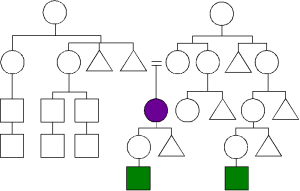![]()
![]()
![]()
![]()
![]()
![]()
![]()
![]()
![]()
matēnnīkōn
We’re on sentence 14 of the LCC4 relay text:
temme ien pa ē matēnnīkōnēri ē matēnnīkōnēle ī le ancē ja sere jāo;
So, a matēnnīkōn is someone who is/was engaged in the jatēnnīke ceremony with someone. Here this translates as “spouse” or “husband” or “wife”. More on this sentence tomorrow.
